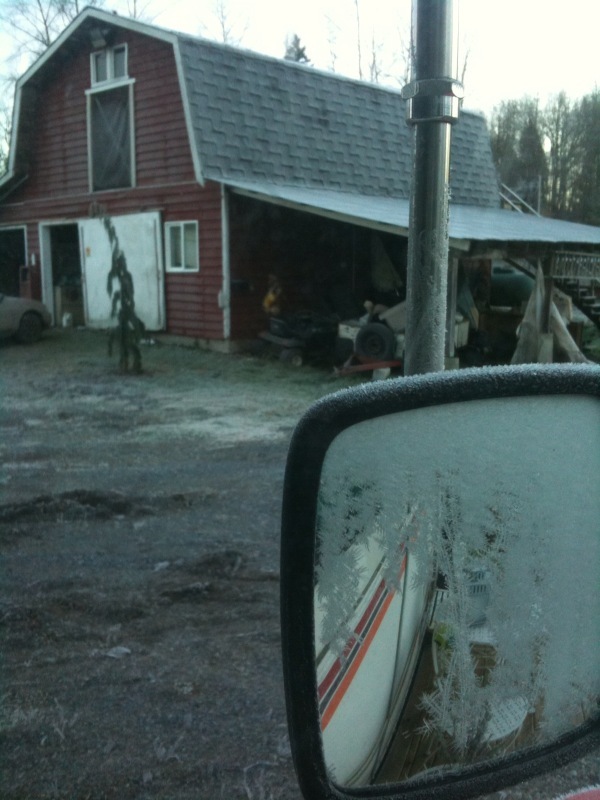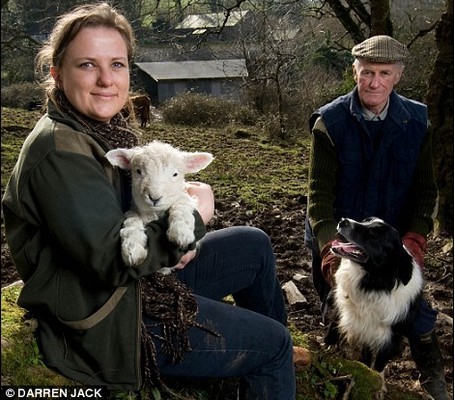So, our little Farm for a Year project has officially made the press! An interview I had with writer Christina Crook has been published on canadianchristianity.com. Fun! You can see the article here, but I’ve also reposted it below:
So long office…hello farm!By Christina Crook
IT MIGHT be the sun skittering across the rounded tin of her trailer as day breaks. It might be the years spent in Africa witnessing the sure reward of a hard day’s labour. It might be the deep-seated desire to put her master’s studies in Environmental and Sustainable Development Economics to work.
It might be all these things and more that led Jocelyn Durston to abandon her meticulously designed apartment and cushy policy job in Ottawa and take up residency on a fledgling farm for a year.
Durston is a 31 year old Vancouverite who used to dream of farming – until, one day, she tired of dreaming and decided to get her hands dirty. She bought a 1978 motorhome, sold and donated most of her belongings and moved to Maple Ridge, B.C. (along with her cats, Fergus and Lola) to help some friends start up a small farm.
Along with couples Julie and Chris, and Matt and Chantalle Moerman, and their two toddlers, Durston began the ‘farm for a year’ project in September 2010. The goal is to transform 2.5 acres into a sustainable, flourishing, environmentally sensitive, small working farm.
Inspired by the belief that a healthy future will require the re-localization of food production, the small organic mixed farm will serve as an experiment in gardening, caring for livestock and sustainable living. Using principles of traditional farming, with a respect for healthy living soil, the five are endeavoring to see just how much can be produced on a small plot of land by a bunch of novices.
Durston, who also works as Trinity Western University’s Peer Giving Solutions Coordinator, agreed to answer some questions about the experiment.
What is the motivation?
My current ‘year on a farm’ adventure is in very large part a response to craving a level of spiritual connectedness to something more – something that I have a hard time finding in my daily 9-to-5, urban life. I’m sure it’s there – I just want something that’s way less easy to ignore: an in-my-face kind of glory and inspiration and peace and understanding that I have found in the brief experiences with nature and close community I’ve had in my past. But brief hasn’t been doing it for me. I want the daily goods, the stuff that comes when we truly connect ourselves to the most basic and natural elements that came out of creation: the earth, animals and human relationships.”
How was the idea born?
I’m pretty sure I can pinpoint when my childhood daydreams of “Wouldn’t it be cool to live on a farm?” became a more serious interest. I was 23 years old, in my third year at TWU, steadily working towards a BA in Development Studies and working part-time at a health food store in Langley. I was already interested in politics, food security, development and environmental issues, but it was in the hours spent reading health food store propaganda while working quiet Willowbrook Mall evening shifts that I really began to wrap my head around the global politics of food – and its connection to everything. After that, things just kind of started steamrolling.
What prompted ‘farm for a year’?
My interest in agriculture lasted through the rest of my TWU years and hasn’t stopped. I moved to the UK and earned a Masters degree, writing my thesis on the food security sustainability of ecologically sustainable urban agriculture. When a career opportunity took me to Ottawa, I started volunteering locally with a local food justice organization and quickly got the opportunity to help start up a community garden in the neighbourhood I was living in. When I moved back to B.C. for a job at TWU, I still had the farming idea in the back of my mind.
After I’d been living in the city for a few months, I was starting to feel fidgety and wanted to figure out a way to bring the farm aspect to my life. Chris and Julie had been talking to me about coming out and helping with the farm. I remembered their proposal, and so I emailed them. Within a week, it was a go. Today I get to be with my favourite people in the world and help them tackle their dream.
How is this a step of faith?
For me, the most impacting faith experiences have taken place when I am part of a very strong community and interacting with nature on a practical level. These have been the times I have most connected to God. The times I have felt happiest and experienced the most joy have been outside, whether travelling or exploring nature. So, the farm give me those two things. Being outside, getting dirty, breathing the air and working with animals and plants are such a tangible example of God’s creativity and his love of life. Also the community aspect is huge. The community we have on the farm is like the community you search out at church. We talk together, share meals together, tackle challenges together. When I leave my day job and get to the farm, it’s like a weight lifts.
What have you had to sacrifice?
I have given up things on the material side, donating a ton of my personal belongings because I was moving into a small space. Certainly I’ve given up living space – the trailer is small. I had to be very thoughtful about the things I kept. I have given up an indoor bathroom. I have a shower, but I’ve given up endless hot water. I have also given up living in downtown Vancouver; the ability to live in a place where I can commute anywhere by bicycle was a big sacrifice. I gave up a certain level of privacy. But I feel like what I have gained very much outweighs what I’ve given up.
Have there been unexpected joys?
Living with children. I have never lived in close proximity with kids. I love them. I have developed such an appreciation and love for these kids.
What happens once the year is up?
We are going to reassess when we are close to the year mark. As it is, all of us want me to stay here longer, and if we are still happy with the arrangement, then we would likely turn it into ‘farm for two years.’ As for the farm, the first goal is to be self-sufficient for everyone that lives here. After that, we would love to learn to grow more so we can sell produce and help sustain the farm financially. We dream abou
t this being a place for workshops and school field trips.
What have you learned about following your dream?
I would say, “Do it,” if you are really feeling that strong pull. My motto is that life is too short. God has created us to be these creative individuals who have hearts with dreams, and if we feel our hearts pulled in a particular direction, that’s God. Fear can hold us back a lot. If we step out and take that risk – God surprises us in ways that we can’t imagine.
Reposted from www.canadianchristianity.com

